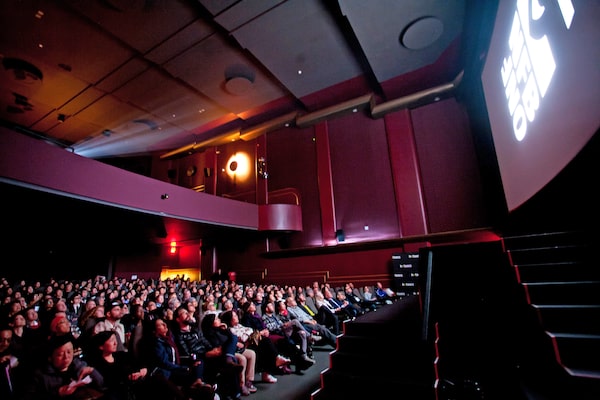
People attend a screening at the Hot Docs Ted Rogers Cinema. The COVID-19 pandemic forced organizers to postpone this year's Hot Docs film festival.Christian Pena/Courtesy of Hot Docs
Just how close was the 2020 Hot Docs film festival to proceeding as planned, before the COVID-19 pandemic forced organizers to postpone? So close that the decision to press pause was announced to senior staff in a conference room plastered floor to ceiling with Post-it notes detailing finalized screening times.
“The festival was literally surrounding us, just as we were talking about having to postpone it,” says Shane Smith, director of programming for the annual Toronto documentary festival. “We were scheduling the festival as if was going to happen up until we couldn’t.”
A few days after Hot Docs announced it was postponing its 27th annual fest, scheduled to run April 30 through May 10, Smith and executive director Brett Hendrie walked The Globe and Mail through the “heartbreaking” decision to postpone (but not “cancel,” as the organizers emphasize) this year’s edition of North America’s largest celebration of documentary cinema.
When did you first begin to monitor the coronavirus situation, and believe that it could realistically affect the festival?
Brett Hendrie: We started in January, and it was top of mind, having run the festival at the peak of SARS in 2003. Back then, we had a huge decline in international participation, particularly on the industry side. But the public screenings happened. So when we first started tracking coronavirus, we thought international broadcasters and distributors might not be able to come. Then we had a period for a good month and a half when a good cross-section of the organization was simultaneously planning for the festival, for a different kind of festival and for a non-festival.
The Toronto festival is North America’s largest celebration of documentary cinema.Gabriel Li/Handout
Shane Smith: The bulk of this fell on senior leadership, connecting and exchanging information as well as doing the day-to-day job of putting on the festival. It was an extra strain for sure, but it was important to pay attention to, especially looking at what our colleagues at other festivals were facing, like Tribeca and Copenhagen.
Hendrie: We had three scenarios: cross your fingers and hope it’s okay, a controlled stop and an emergency stop. It was tough to figure out how those translated with real-world information, which was coming at you like you were drinking from a fire hose.
This past Friday, the day that you decided this year’s fest couldn’t go on as planned, what was the atmosphere and reaction in the office?
Hendrie: It was heartbreaking to come to that point. It’s unprecedented for us, and extremely difficult. Less so because of the potential toll on the organization, but more so because we know that there are hundreds of filmmakers and thousands of audience members looking forward to coming and sharing these films. We were committed, and are committed, to bringing these films to people and championing these filmmakers. But to not have Hot Docs on the calendar, it hurts. It’s a loss.
Smith: Hot Docs is spring in Toronto, as a lot of our audiences have since told us. We’re sad for all the work that has been done and that’s been postponed for now. But we’re even more sad for the filmmakers and audiences.
Hendrie: That’s especially acute for the world and international premieres we had on the docket. The birthing of a film … these filmmakers have put their hearts and souls into the work and were excited to bring it to Toronto.
How many layoffs resulted, both on the festival side, and for the year-round Hot Docs Ted Rogers Cinema [which suspended operations two days after Hot Docs postponed its festival]?
Hendrie: With the cinema, as a charity we did have to temporarily lay people off. But we’re working to expedite pay and help them immediately with [records of employment], and we’re actively watching potential relief efforts and have them top of mind. With the festival side, some seasonal staff are winding down their contracts earlier.
When the decision to postpone was announced, there was a part noting that Hot Docs remains committed to “bringing these films to audiences” and that you were investigating ways to bring the industry together in some sort of online environment. Where are you with that?
Hendrie: We’re moving as fast as we can, and I’m hopeful to have more information to share in a few weeks, if not earlier. We’ve done a fair bit of contingency planning beforehand – like on the market side, we’re in a good position to go forward digitally with our Doc Shop, which is a business-to-business program for buyers and other programmers. We normally track $20- to $40-million in business deals for filmmakers on the market side, so not having our event on the calendar is disruptive to the industry.
Is there a sense of cautious optimism, moving forward?
Hendrie: A challenge like this presents an opportunity to be nimble on how we focus on our mission, which is: to bring new films to audience and to support filmmakers. This is a chance to innovate and move fast. And we have our own venue with a committed audience there, so our ability to bounce back with that as an anchor is important.
Smith: Audiences, especially after being isolated, crave community. I don’t think that will change, and that’s the beautiful thing about Hot Docs: the connection that brings people together who otherwise might not. I don’t think that desire – for information, for insight into our world – is going away. Documentarians have been showing that path forward for a long time, and I don’t see it stopping any time soon.
This interview has been condensed and edited
Plan your screen time with the weekly What to Watch newsletter, with film, TV and streaming reviews and more. Sign up today.
 Barry Hertz
Barry Hertz